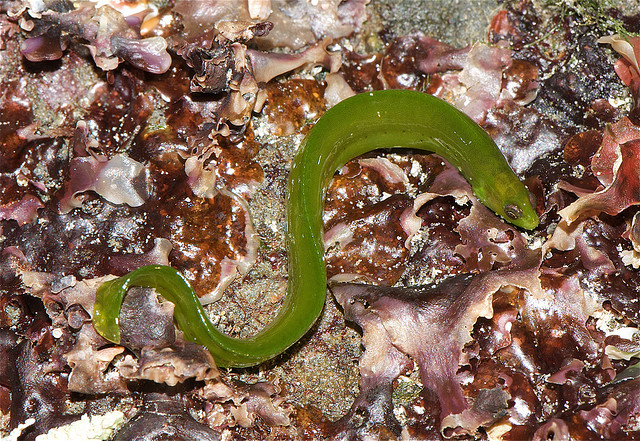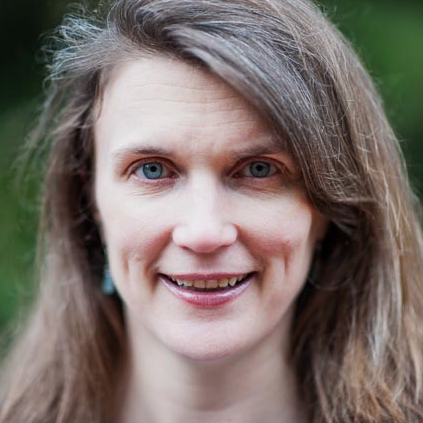Flash Nonfiction by Julie Jeanell Leung
A Field Guide to Forgiveness

As a child, whenever I walked to school in the rain, the earthworms frightened me. They were tiny serpents, wriggling in the sudden flood, a ghostly violet gray. I stepped around them, afraid to touch one, even with a rubber boot. From Sunday School, I thought worms were the only creatures alive in hell. I imagined them tunneling through corpses, devouring the dead.
Decades later, while my mother was dying, I began walking across beaches near my home, examining tide pools on the island where I lived. Daily, she dialed my number, her voice gasping and wheezing from heart failure. Mentally ill, my mother worried about the end of the world. She wanted to tell me what to do after her death, listing the names and numbers of friends to contact, the important papers and photographs in her multiple storage units. Instead of answering her calls, I often spent hours crouched along the shores of Puget Sound, listening to the crashing waves.
At first, while walking the beaches, I didn’t look for worms. I searched for starfish in sunset hues of magenta and orange. Lifting up rocks, I noticed gunnels, eel-like fish the color of seaweed, and armies of crabs waving their claws. Still, worms were everywhere. Dramatic ribbon worms in slender red or orange, sliding under rocks. Flatworms as large as my thumb and as dark as blood. Spaghetti worms burying themselves in the sand with only their white tentacles visible.
Field guides were my friends, and I trained to become a volunteer beach naturalist. The pages of my favorite book warped and faded from use whenever I wandered beside the sea.
My mother died in February 2013, and after her death, strangers sent me cards. They filled my mailbox with cursive words of sympathy, surprising me. One said that almost fifty years ago my mother had taught her “how to make a delicious and fluffy mashed potato.” The writer assumed my mother must have taught us how to cook, too. But my siblings and I couldn’t remember her making mashed potatoes or anything except an occasional birthday cake.
When she returned to work, at the end of the alimony, I became the family chef, a fifth grader with Kraft macaroni and Lipton soup boxes as my kitchen companions. One night, I burned myself, and the skin on my arm blistered and darkened beneath layers of gauze, leaving a scar that remained for decades.
In 2013, as I walked along the island shore at a springtime low tide, I noticed the green serpentine motion of gunnels speeding through the shallow waves. I knew their common name. I thought I knew where to find them—curled like snakes beneath rocks at low tide. But how far they could swim, these fish I struggled to recognize in the open ocean. I had imagined I was an expert on marine biology, memorizing my field guide, studying how to identify intertidal life. But all I knew were temporary adaptations made in tide pools.
Later, as I sorted through my mother’s papers on my living room floor, I discovered a picture of my father in his Army uniform from the time our family had lived in Kansas. He stood beside the chain-link gate, a tall figure in olive green. A few years after this photograph, the young man in the uniform would leave us, moving to his own apartment. The color and slender shape in the photo reminded me of a gunnel.
My mother's pictures were like images of creatures trapped under rocks, caught in depressions, stranded on sand. Combined with the cards from strangers, they became a field guide to my family. Here were descriptions to aid with understanding behaviors and adaptations. Here were illustrations for finding forgiveness.
That same spring, I accompanied my middle daughter to a teleconference at her school, where we watched NASA scientists discuss the possibility of life on other worlds. An astrobiologist on the panel said one of Jupiter’s moons could host life, although it might not resemble human forms.
He specifically mentioned worms. Because bacteria and tubeworms have been found living without sunshine and oxygen, in deep-sea vents on Earth, it’s possible they could thrive in the aqueous seas of Europa. In response to a question, the scientist said that yes, he believed there was life on other worlds.
Without my mother, I was suddenly living on a lonely world far from sunlight, on a new planet of grief and anger, where I struggled to breathe or move, as if stranded at low tide. Walking along the shore that summer, I admired the white calcareous tunnels of tubeworms. I imagined worms on Europa.
I, too, believed in life on other planets.
Art Information
- "Rockweed Gunnel" © Jerry Kirkhart; Creative Commons license.
 Julie Jeanell Leung recently graduated from the Rainier Writing Workshop, the MFA program at Pacific Lutheran University in Tacoma, Washington. Her creative nonfiction has appeared in a number of publications, and her essays have received first place in the 2015 “Pro Forma” Contest held by Grist: The Journal for Writers and the 2014 Living Earth Nonfiction Prize from Blue Lyra Review.
Julie Jeanell Leung recently graduated from the Rainier Writing Workshop, the MFA program at Pacific Lutheran University in Tacoma, Washington. Her creative nonfiction has appeared in a number of publications, and her essays have received first place in the 2015 “Pro Forma” Contest held by Grist: The Journal for Writers and the 2014 Living Earth Nonfiction Prize from Blue Lyra Review.
A beach naturalist and citizen scientist, she can be found at low tide counting sea stars on the island shores.
